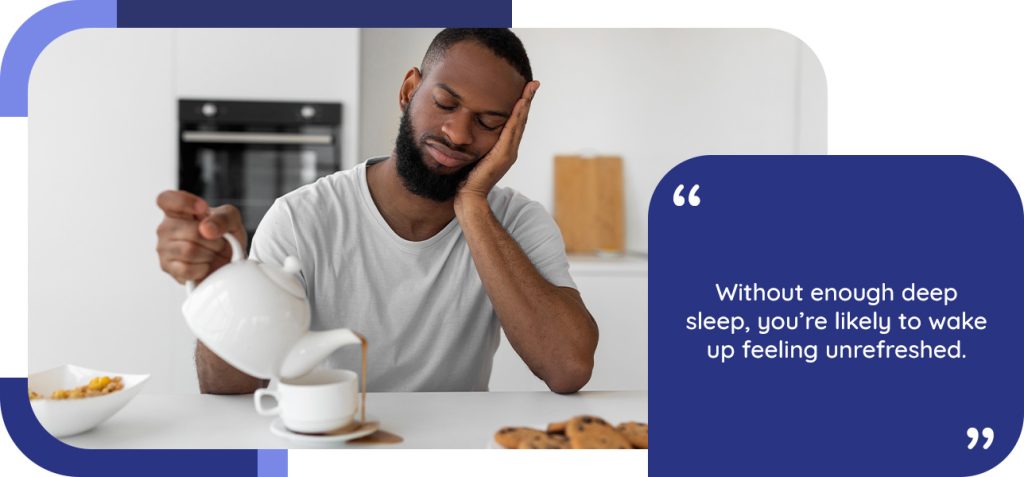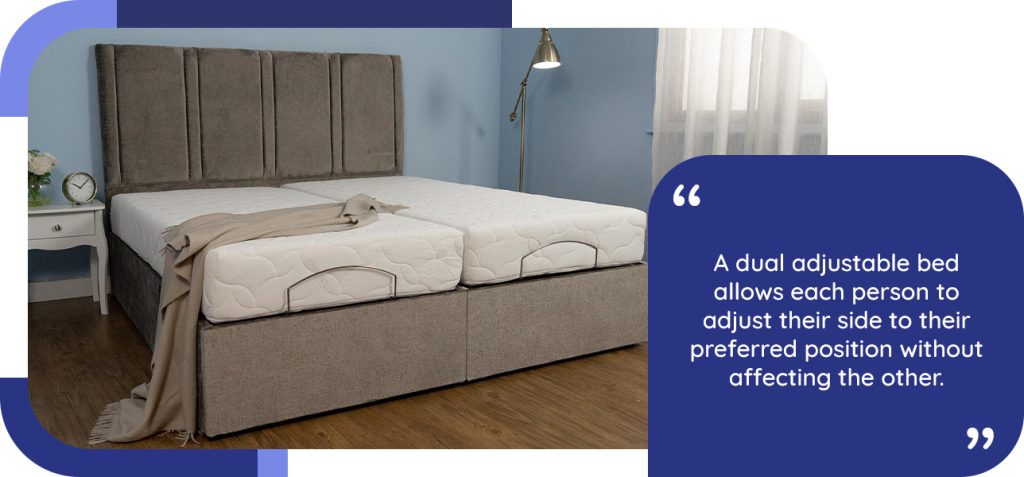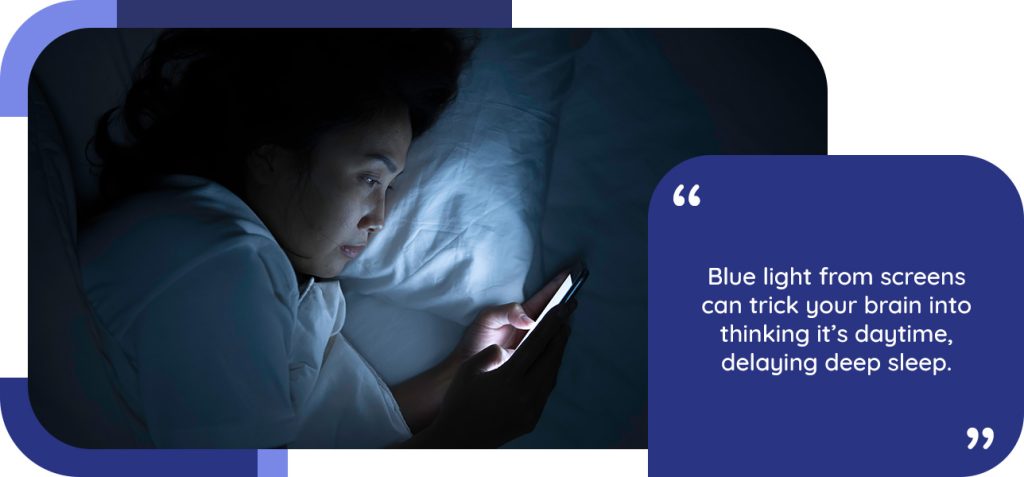When does deep sleep occur?

Deep sleep is a key stage of sleep, often considered the most important. It’s when your body repairs itself, helping you wake feeling refreshed. This guide will explain when deep sleep occurs, how much you need, its benefits, the consequences of not getting enough, and tips to improve it, including how electric adjustable beds can help.
Table of contents
- What is deep sleep?
- How much deep sleep do you need?
- When does deep sleep occur during the night?
- The importance of deep sleep
- Sleep position and support
- Give yourself (and your partner) enough space
- Reduce snoring and sleep apnoea disruptions
- Maintain a consistent sleep routine
- Optimise your sleep environment
1. What is deep sleep?
Deep sleep, also known as slow-wave sleep (SWS) or stage 3 NREM sleep, is the deepest stage of the sleep cycle. During this stage, your brain waves slow to long, slow delta waves, and your muscles, heartbeat, and breathing rate all reach their lowest levels.
It is very difficult to awaken someone from deep sleep. Waking abruptly from deep sleep can leave you feeling disoriented or groggy, which is normal.
During deep sleep, the body enters “restoration mode”. You can typically sleep through loud noises or minor disturbances during this phase. This is when major physical healing and recovery processes occur: your body repairs tissues, releases important hormones, and fortifies the immune system.
Deep sleep is crucial for feeling refreshed the next day; without enough, even a full night’s sleep can leave you unrested.
2. How much deep sleep do you need?
Most healthy adults spend about 20–25% of the night in deep sleep. In an average 8-hour sleep, this amounts to roughly 1.5 to 2 hours of deep sleep per night. Sleep scientists consider anywhere from about 13% to 23% of total sleep time to be a normal amount of deep sleep for adults.
The amount of deep sleep naturally changes with age. Children and teenagers typically get plenty, but as we age, we naturally get less deep sleep. Adults over 60 may experience significantly reduced deep sleep; one study found they get up to 70% less deep sleep than younger adults in their 20s. This means an older person might get only a few tens of minutes of deep sleep per night, compared to a couple of hours for a younger adult.
Despite this reduction with age, deep sleep remains important at every stage of life. While there’s no exact recommended number of deep sleep hours for each age, ensuring you get enough total sleep (7–9 hours for most adults) will help maximise your deep sleep. Consistently getting less sleep than you need will cut short the time spent in deep, restorative sleep.
3. When does deep sleep occur during the night?
Deep sleep primarily occurs in the early part of the night. Sleep experts have found that the first third of the night is when we experience the deepest and longest periods of slow-wave sleep.
During the first few sleep cycles after you fall asleep (approximately the first 3–4 hours), your body will cycle into long stretches of deep sleep. After each deep sleep period, you enter REM sleep, and then a new cycle begins.
As the night progresses, deep sleep stages become shorter and lighter, while REM sleep stages get longer. By the late night or early morning hours, deep sleep may be minimal or entirely absent in the cycles before waking.
Sleep in those later cycles consists mostly of lighter stages (stage 1–2) and REM (dreaming) sleep. For example, in the first 1–2 cycles of the night, you might spend 20–40 minutes in deep sleep per cycle. However, in the last couple of cycles before waking, you might get only a few minutes of deep sleep or none at all, as your brain transitions more to REM sleep. This explains why you are harder to wake in the early night (often during deep sleep) but tend to sleep more lightly towards the morning.

4. The importance of deep sleep
Deep sleep is sometimes called “restorative sleep” because it’s when your body and brain perform critical maintenance tasks. Failing to get sufficient deep sleep (whether because you aren’t sleeping enough overall, or due to sleep disruptions) can lead to a variety of problems, noticeable both short-term (the next day) and long-term.
Benefits of adequate deep sleep
Physical repair and growth
During deep sleep, your body releases growth hormone, which stimulates tissue growth and muscle repair. This is when cellular repair occurs – your body fixes damage from the day and regenerates cells.
Deep sleep is also when muscles and joints recover from daily stresses, which is why athletes and anyone who is physically active especially need sufficient deep sleep. In children and teens, deep sleep supports growth of bones and tissues.
Energy restoration
Deep sleep largely recharges your body’s energy stores and helps restore mental alertness, contributing to that refreshed feeling you get after a good night’s rest.
Memory consolidation and learning
The brain is busy during deep sleep, processing and consolidating memories and new information (transferring them from short-term to long-term storage). Slow-wave brain activity during deep sleep helps us form and retain memories, crucial for learning new facts or skills.
Immune system boost
Deep sleep strengthens your immune response, helping you fight off infections. If you do get sick, deep sleep is when your body ramps up immune cell production and fever responses to combat the infection.
Adequate deep sleep keeps your immune system in top form, whereas chronic sleep deprivation can weaken your defences.
Brain “detox” and health
New research suggests deep sleep may help “clean” the brain. During slow-wave sleep, cerebrospinal fluidflow in the brain increases, which might help flush out waste products that build up during the day (such as beta-amyloid, a protein linked to Alzheimer’s disease).
Many scientists believe deep sleep is crucial for long-term brain health, possibly reducing risks of neurodegenerative diseases.
Emotional wellbeing
Quality deep sleep contributes to emotional balance. When you get enough deep sleep, you’re more likely to wake up in a stable, positive mood. Deep sleep helps your brain reset and regulate emotions.
Consequences of insufficient deep sleep
Persistent fatigue and grogginess
Without enough deep sleep, you’re likely to wake up feeling unrefreshed. People who miss out on deep sleep often report that even if they spent many hours in bed, they don’t feel truly rested. Over time, this can lead to chronic daytime fatigue.
Cognitive impairment
Your memory and concentration suffer when deep sleep is cut short. Since the brain doesn’t get adequate time to consolidate memories, you may find it harder to learn new information or remember things you just learned. Decision-making and problem-solving skills can also decline, leading to a “mentally foggy” feeling.
Hormonal and metabolic changes
Lack of deep sleep can disrupt the normal balance of hormones that regulate appetite and metabolism. It is associated with increased levels of ghrelin (stimulating hunger) and decreased levels of leptin (signalling fullness), meaning you may feel hungrier and crave high-calorie foods after poor sleep.
Regularly missing deep sleep can contribute to weight gain and increase the risk of metabolic conditions, including heart disease and type 2 diabetes.
Weakened immune response
If you frequently get insufficient deep sleep, your immune system may weaken, leaving you more vulnerable to infections like colds or flu. You might notice you catch illnesses more often or take longer to recover. Poor sleep has been linked to higher inflammation in the body, a risk factor for many chronic illnesses.
Mood and mental health issues
Not getting quality deep sleep can negatively affect your mood and emotional resilience. In the short term, you might be irritable, cranky, or prone to stress. Over time, chronic sleep deprivation is associated with a higher risk of anxiety and depression.
If you recognise some of these issues in yourself, it might be a sign that you need more deep sleep.

5. How to get more deep sleep
Getting enough deep sleep starts with overall good sleep habits (sleep hygiene). By improving your sleep environment and routine, you give your body the best chance to cycle naturally into deep sleep. Additionally, using the right bed and sleeping position can make a big difference.
Here are some tips to improve your deep sleep, including ways an adjustable bed can help you achieve deeper, more restorative sleep each night:
Sleep position and support
An adjustable bed allows you to elevate your upper or lower body to find a comfortable sleeping position, reducing pressure on joints and promoting deeper sleep. On a flat, traditional bed, side-sleeping is often recommended as “best” for many people. While healthy, it can pressure shoulders, hips, and the lower back, potentially causing discomfort that interrupts sleep. Back-sleeping on a flat bed can also cause lower spine pressure for some. The key is to find a sleeping posture that keeps your spine aligned and pressure points relieved, preventing aches or pains from waking you.
This is where an electric adjustable bed can be a game-changer. An adjustable bed lets you raise the head or foot sections, contouring to your spine’s shape and supporting your body’s natural curves. For example, if you have lower back pain, you can elevate your upper body and knees slightly (a “zero-gravity” position) to relieve pressure on the lumbar area. If you have shoulder or hip sensitivity, you can adjust the angle to reduce pressure on those joints.
By finding a pain-free, comfortable position, you’re less likely to wake due to discomfort, leading to more uninterrupted deep sleep. Many people report less tossing and turning and fewer awakenings with an adjustable bed. Over the night, this translates to more time spent in deep sleep.
The goal is to wake up feeling refreshed, not with a stiff back or sore hips. A supportive adjustable bed mattress (like quality memory foam or a hybrid mattress designed for adjustable beds) can further enhance this by evenly distributing weight.
Give yourself (and your partner) enough space
If you share a bed, consider if its size affects your sleep quality. Two adults sharing a standard double bed have under 70 cm of width each, which is quite snug. If you or your partner move during the night, a small bed can lead to accidental bumping and disturbance. Your partner’s tossing, turning, or body heat could disrupt your sleep cycles, preventing you from getting the deep sleep you need.
If space allows, opt for a larger bed size. Upgrading to a king-size (or at least a queen-size) bed will give both of you more personal space to sleep comfortably. More space means you’re less likely to disturb each other, resulting in fewer awakenings at night. Couples who don’t unintentionally wake each other will both enjoy more continuous deep sleep and REM sleep.
For an optimal setup, some couples choose dual adjustable beds or a split-king adjustable bed – essentially two adjustable beds side by side, controlled independently. This allows each person to adjust their side to their preferred position without affecting the other.
Reduce snoring and sleep apnoea disruptions
Snoring, especially a partner’s, can hinder deep sleep. While it’s a myth that snoring indicates deep sleep, snoring usually happens in lighter stages or REM sleep, and a snoring partner can prevent you from reaching deep sleep.
If loud snoring keeps you awake, neither person may get quality rest. If sleep apnoea is involved (brief breathing pauses often with loud snorts), it can fragment the snorer’s sleep pattern, reducing their deep sleep time.
An adjustable bed can help tackle both snoring and mild obstructive sleep apnoea by elevating the upper body. Sleeping with your head and chest slightly raised uses gravity to keep your airway more open. This reduces the collapse of throat tissues that cause snoring and apnoea pauses.
Many people with snoring or nasal congestion find breathing easier with the bed at a gentle incline. Doctors often suggest sleeping in a raised position as an at-home remedy for snorers and those with mild OSA (obstructive sleep apnoea). While it doesn’t replace medical treatments like CPAP for moderate/severe sleep apnoea, it can significantly improve airflow.
If snoring is an issue, consider other tips like nasal strips, a humidifier (if dry air contributes), or side-sleeping. However, the major advantage of an adjustable bed is that it ca be adjusted at the touch of a button, allowing you to find the exact angle that quiets the snoring.
Maintain a consistent sleep routine
One of the simplest yet most effective strategies for improving deep sleep is to maintain a regular sleep schedule. Our bodies have an internal clock (circadian rhythm) that thrives on consistency. If you go to bed and wake up around the same times daily, your body learns when to expect sleep and can optimise your sleep cycles accordingly. This consistency increases your likelihood of getting a full complement of sleep cycles, including those deep-sleep-rich early cycles, each night.
Frequently going to bed very late or at varying times can shorten the number of full cycles you get. For example, staying up late and then sleeping a shorter time can cut off the deep-sleep-heavy part of the night. Even sleeping in on weekends can disrupt your rhythm, making it harder to fall asleep at your normal time later.
Strive for a steady routine: try not to vary your bedtime or wake time by more than an hour, even on weekends. This keeps your body clock aligned, making it easier to fall asleep and progress naturally into deep sleep.
If you struggle to fall asleep on schedule, build a relaxing pre-bed routine. This might include dimming lights, avoiding screens for an hour before bed (blue light can trick your brain into wakefulness), doing quiet activities like reading or gentle stretching, or taking a warm bath. These habits signal to your body that it’s time to wind down.
Adjustamatic beds come with built-in massage therapyfunctions, which many customers use as part of their wind-down routine; a 10–20-minute gentle massage before bed can relax muscles and relieve tension, easing you into sleep. If pain often keeps you awake, the bed’s massage feature can be particularly helpful for muscle relaxation and comfort.

Optimise your sleep environment
Your bedroom environment significantly impacts sleep quality and the ease of reaching deep sleep. Create a sleep-friendly environment that encourages relaxation:
Keep it dark, quiet, and cool
Darkness signals your brain to produce melatonin, the sleep-initiating hormone. Use blackout curtains or an eye mask if light enters. Reduce noise with earplugs or a white noise machine if needed, as sudden noises can pull you out of deep sleep. A cooler room (around 16–18°C for many) is generally best for sleep, as warmth can cause restlessness and sweating that disturb slumber. During deep sleep, your body temperature naturally drops, so a cool room supports this process.
Comfortable bedding
Ensure your mattress and pillows are comfortable and supportive. An old, sagging, or unsuitable mattress (too firm or soft) might cause discomfort or pain that interrupts deep sleep. Consider a mattress compatible with an adjustable bed for optimal positioning.
The right pillow (height, firmness) will keep your neck aligned. High-quality, breathable bedding can also prevent overheating or chilling at night.
Limit electronics and blue light
Ideally, keep TVs, computers, and phones out of the bedroom, or at least turn them off well before bedtime. Blue light from screens can trick your brain into thinking it’s daytime, delaying deep sleep. If you watch TV in bed, using the adjustable bed to elevate your head is comfortable, but set a timer to turn it off to avoid electronic interference.
Calming atmosphere
Some people find that relaxing scents (like lavender essential oil) or very soft calming music help set a sleepy mood. While not direct deep-sleep inducers, anything that reduces stress and anxiety at bedtime can help you fall asleep faster and enter deep sleep more efficiently.
An adjustable bed can also aid relaxation – for instance, you might enjoy reading in an elevated position, then gradually lower the bed as you feel drowsy, reaching a flat or preferred sleeping angle for the night.
If you have persistent sleep problems (like chronic insomnia or suspected sleep apnoea) despite these changes, it’s important to talk to your GP or a sleep specialist. They can check for underlying issues and offer treatments.
Many sleep disorders are treatable, and often, combining solutions like adjustable beds with medical guidance can significantly improve your sleep quality. The goal is to ensure nothing prevents you from getting that all-important deep sleep.
6. Transform your nights, transform your health
Now that you understand the critical importance of deep sleep and how it occurs in those precious early hours of the night, are you ready to give your body the best possible chance to achieve the restorative sleep it needs?
If poor positioning, discomfort, or sleep disruptions are stealing your deep sleep, it’s time to consider buying an adjustable bed that works with your body’s natural sleep cycles.
Why Adjustamatic beds are engineered for deeper, more restorative sleep
At Adjustamatic, we understand that quality sleep is essential for your physical health, mental wellbeing, and daily vitality. That’s why every bed we craft in our UK workshop is designed to support your body’s natural sleep architecture.
What makes our approach to sleep optimisation unique?
- Precision positioning for pain-free sleep: Our adjustable beds allow you to find that perfect zero-gravity position that relieves pressure on your spine, hips, and shoulders—eliminating the discomfort that can pull you out of deep sleep cycles. When your body is properly supported, you can stay in those crucial deep sleep stages longer.
- Advanced sleep-enhancing technology: Features like our NHC Cyclo-Therapy® massage system help you unwind before sleep, while our zero-gravity positioning mimics the weightless posture that promotes the deepest, most restorative sleep phases.
- Mattress systems designed for optimal sleep: Our AirFlow® orthopaedic mattressis specifically engineered to work with adjustable bases, providing the perfect balance of support and flexibility that allows your body to settle into deep sleep without pressure points or overheating.
- Personalised sleep solutions: Whether you need elevation to reduce snoring, independent controls for you and your partner, or specific therapeutic positioning, we create sleep environments tailored to your unique needs and challenges.
Ready to reclaim your deep sleep?
Don’t let another night of poor sleep rob you of the restoration your body desperately needs. Our sleep specialists understand the science behind quality rest and can help you create the optimal sleep environment for deeper, more restorative nights.
Experience the difference firsthand: Book a complimentary home consultation where you can test our beds and mattresses in your own bedroom, discover the positions that work best for your sleep challenges, and feel the quality that comes from decades of British craftsmanship.
Call us today free on 0800 689 9823 (lines open 9am-5pm Monday to Friday) or send us a message to request your free consultation. With a single call, you too can discover how Adjustamatic helps unlock the deep sleep your mind and body deserve—night after night.
Because when you sleep better, you live better.


